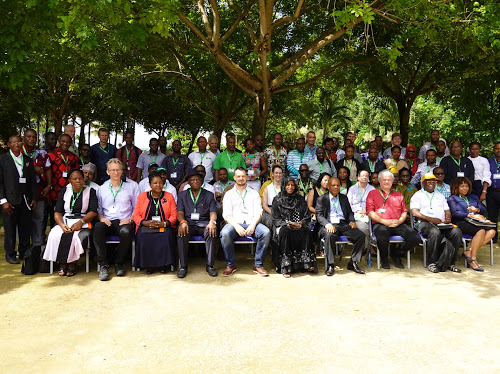Agronomic recommendations being developed by the African Cassava Agronomy Initiative (ACAI) are contributing to the goals and national priorities of Zanzibar, says Ms. Maryam Abdalla, Principal Secretary of Zanzibar’s Ministry of Agriculture, National Resources, Livestock and Fisheries.
Ms. Abdalla who was the Guest of Honor at the 2019 ACAI annual Review & Planning that was held in Zanzibar (9-12 December) said the ACAI project was “contributing to the bigger goals of Zanzibar’s agricultural growth”.
Located 25-50 kilometers off the Tanzania coast, Zanzibar is a semi-autonomous region in Tanzania whose population depend mostly on cassava and sweet potato as staples.
Over the last 4 years, ACAI has worked with the Zanzibar Agricultural Research Institute, conducting both on-station and on-farm trials on agronomy in cassava and sweet potato farming systems.
“These two crops—cassava and sweet potato are among the most significant sources of food on the island that are locally produced by farmers,” Ms. Abdallah said.

In 2018, Zanzibar launched its second phase of the Zanzibar Agricultural Sector Development Program (ZASDP) in collaboration with actors from different sectors of the economy as part of efforts to improve agricultural productivity, food security and sustainable livelihoods.
We are happy that in the course of time, initiatives such as the ACAI came up to contribute to the bigger goals for our agricultural growth” – Maryam Abdalla
Ms Abdallah said the ACAI project was playing a complementary role and significantly contributing to the ZASDP.
“We are happy that in the course of time, initiatives such as the ACAI came up to contribute to the bigger goals for our agricultural growth,” she added.
She reiterated the commitment of the government to agricultural transformation, adding that Zanzibar would continue to provide the necessary support that would help the ACAI project achieve its goals and by extension the government’s common agenda of improving the lives of people in Zanzibar.
Dr Bernard Vanlauwe, Principal Investigator for ACAI and IITA Director for Central Africa lauded the government of Zanzibar and Tanzania for their support to the success of the ACAI project.
He said the choice of Zanzibar for the annual meeting was driven by the fact that cassava and sweet potato – the two crops ACAI is working on—were very important in the archipelago.
“This makes the work of ACAI in the country relevant,” he added.
